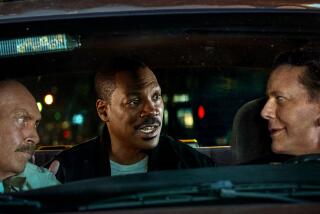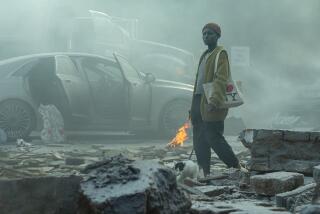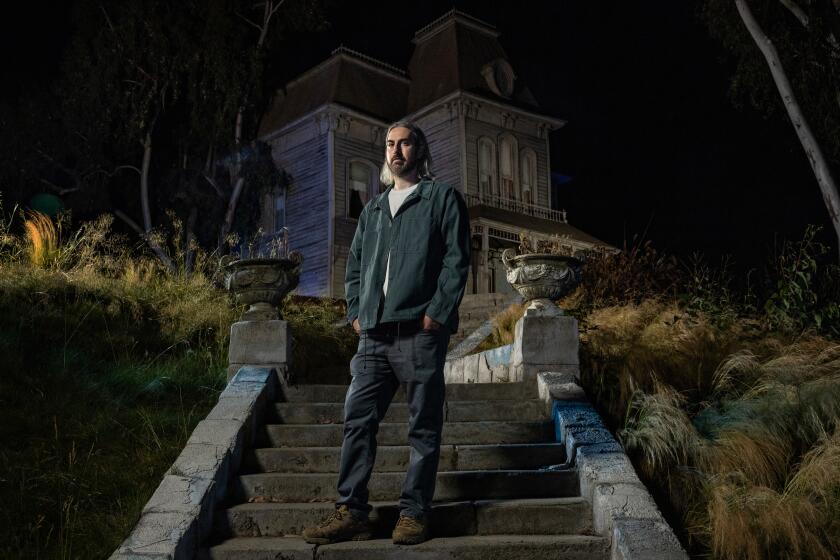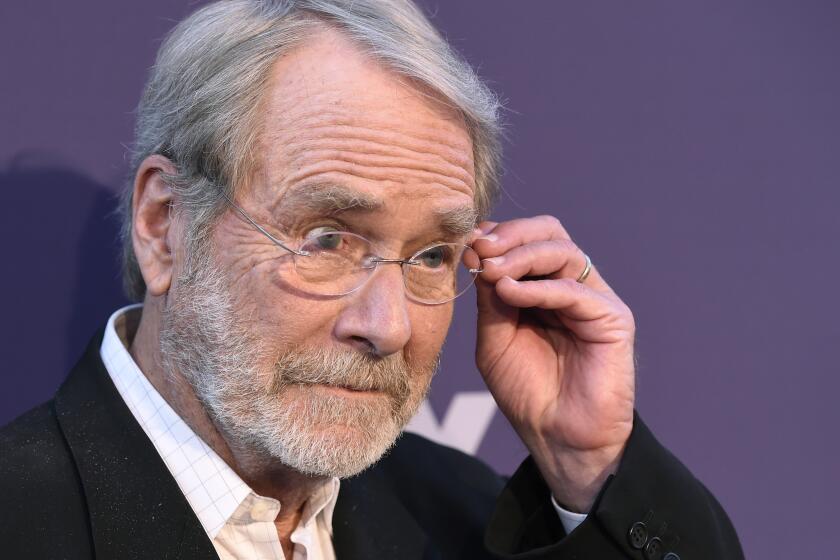Via film, he hops from one life into others
Iranian poetry, Ramin Bahrani says over coffee in a SoHo cafe, has a tradition known as tazmin, in which a poet takes an image, or a verse, from a distinguished predecessor, and crafts something original out of the borrowed fragment.
Bahrani writes no poetry, and his own roots are found more in North Carolina, where he was born and raised, than in his parents’ native Iran, but the concept of tazmin is deeply relevant to his latest film, “Goodbye Solo,” which opens in Los Angeles on Friday. The story of a Senegalese taxi driver and his burgeoning relationship with an elderly white man seemingly intent on ending his own life, “Solo” owes a distinct debt to Iranian director Abbas Kiarostami’s 1997 masterpiece “Taste of Cherry.”
In “Taste of Cherry,” a middle-aged man cruises the streets of Tehran, looking for a young man who will assist him in committing suicide. Like its distinguished predecessor, “Goodbye Solo” is about two men, one intent on dying and the other imploring him to reconsider. Invoking tazmin, Bahrani has crafted a film in the mold of “Taste of Cherry” but one that ventures in an entirely different and uncharted direction.
“It would have been foolish for me not to acknowledge, as I created the story and began writing it, that there’s a film called ‘Taste of Cherry,’ ” says Bahrani. “Goodbye Solo” owes a large debt to Kiarostami not only in its plotting but in its evocative landscape photography, which may remind astute viewers of the director’s “Life and Nothing More.” But tazmin only demands of its practitioners to, as the director sees it, “make it your own and create something new.”
His Iranian heritage notwithstanding, Bahrani’s third film is a deeply American enterprise, passionately devoted to documenting existences otherwise absent from movie screens. Like the work of Kelly Reichardt (“Wendy and Lucy”) or Ryan Fleck and Anna Boden (“Sugar”), Bahrani’s first two films, “Man Push Cart” and “Chop Shop,” were reacting to the ever-bigger, ever-more-grandiose Hollywood blockbuster by telling stories about the invisible of America: the poor, illegal immigrants, the urban working class. “One of the things that was in my head,” Bahrani says of “Man Push Cart,” about a Manhattan pushcart vendor, “was picking a subject that I hadn’t seen before.” Last year’s “Chop Shop” was similarly inclined, with Bahrani’s camera weaving throughout an auto-repair business in the shadow of Shea Stadium.
“Goodbye Solo” is both a continuation of that trend and a divergence. To begin with, it is set in Bahrani’s native North Carolina, not in New York City. The bustling, chaotic streetscapes have been replaced by the bucolic, melancholic patina of the Tarheel State. Bahrani was inspired by an encounter, some years ago, with a local taxi driver who did not himself own a car and had to cadge rides or take cabs to get to his job. Bahrani remembers telling his acquaintance, “You’re a taxi driver and you don’t have a car? One day I’ll come make a film about you.”
Driving around the area while visiting his family, the director would occasionally spot an older gentleman standing at the side of a road, outside a nursing facility. He would wave, and the man would wave back. Bahrani said he would enjoy the encounters but would also feel saddened by what he perceived as the man’s loneliness. The driver without a car and the aimless older man in search of companionship fused in his mind, and the kernel that would become “Goodbye Solo,” written with Bahareh Azimi, began to grow.
The character of Solo, a Senegalese immigrant dreaming of a career as a flight attendant, is another in Bahrani’s gallery of shadow-economy hustlers, striving for a buck and a better life, but he differs in important ways from his predecessors. Solo (Souleymane Sy Savane) is a comical figure, peppering his conversation with half-digested nuggets of hip-hop-inflected speech. Everyone who rides in his taxi is referred to as “big dog,” and he genially asks his passenger William, the older gentleman he picks up (played by Red West), “You like big booties?” Beneath the hearty exterior lies a soul aching for uncomplicated connection. Solo latches on to William in the hope of reminding him of life’s unadorned pleasures.
Bahrani shot the film in and around his hometown, Winston-Salem, in September and October 2007, and was very hands-on when working with his actors, many of whom were nonprofessionals. “He is a filmmaker whose actors feel strongly about working with him,” says Savane, who makes his feature film debut with “Goodbye Solo.” “Ramin, to me, is one of the greatest [directors] right now.”
--
Someone else’s story
Born to a comfortably middle-class family (his father was a physician), Bahrani is drawn to stories least like his own. “It’s really hard to make these films,” he says. “Part of what gives me the energy to do it is learning about things I don’t know about.” And his energy is hard to miss. During the conversation, the boyish, bespectacled Bahrani skips from subject to subject, from the films of John Ford to the politics of John McCain with the effortless fluency of a professor, which he occasionally is, at his alma mater, Columbia University.
There is a near-documentary clarity and forthrightness to his work, but he hardly considers himself a documentarian. “I like to plan things in advance,” he says. In conversation, the director casually refers to his actors by their character names, mentioning only later that “I never call anyone by their real name when I’m working.”
The spaces of his films lie just past the skyscrapers and baseball stadiums, just off the main roads. Bahrani invests them with mystery and richness. A push-cart stocked with coffee and bagels becomes a Sisyphean burden, and a dank alley of auto-repair establishments doubles as the graveyard of childish optimism.
In its evocation of a crumbling American landscape, its racial diversity, its economic anxiety, and its cautious embrace of optimism in the face of chaos and tragedy, “Goodbye Solo” is remarkably of the moment -- more so than even Bahrani could have imagined. “With Obama and the election,” he says, “and the way we’re thinking now -- suddenly three years after the conception of ‘Solo,’ it seems like the perfect time for it.”
Hawking DVDs and phone cards, striving for a better life even as it recedes inexorably into the distance, Solo is no longer just an immigrant on the make -- he is, in this age of recession, the hustler as typical American. “Goodbye Solo,” like Bahrani’s other work, is a report from the front lines of the waning American dream. “There’s some guy on NPR now traveling the country talking to people about the recession. I wish someone were paying me to do that!”
--
More to Read
Only good movies
Get the Indie Focus newsletter, Mark Olsen's weekly guide to the world of cinema.
You may occasionally receive promotional content from the Los Angeles Times.






